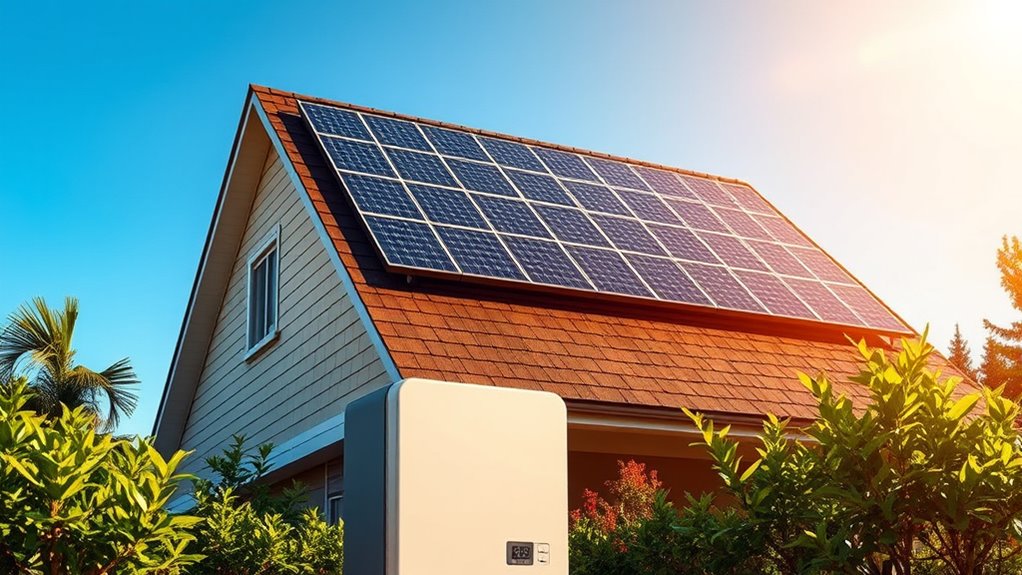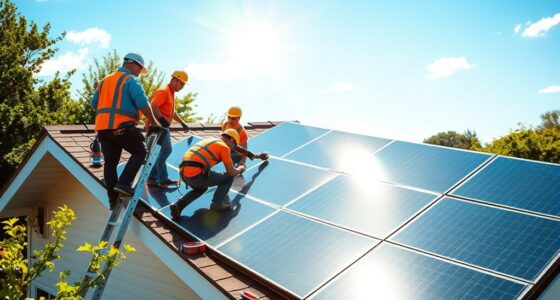If you’re looking for top solar energy solutions for your home, consider high-efficiency panels from brands like SunPower or Panasonic. These models offer great performance and can lead to long-term savings. While installation costs may range from $10,000 to $25,000, tax incentives can significantly lower expenses. Plus, using solar energy helps reduce your carbon footprint and promotes sustainability. There’s even more to explore about innovations in solar technology and installation options that might benefit you.
Key Takeaways
- High-Efficiency Panels: Consider models like SunPower and Maxeon 7 for superior efficiencies above 22%, ideal for maximizing energy production in limited spaces.
- Cost Savings: Installation costs typically range from $10,000 to $25,000, with federal tax credits potentially reducing expenses by 30%.
- Environmental Impact: Solar energy significantly reduces carbon footprints, cutting CO2 emissions and promoting sustainable development while conserving water resources.
- Quality Installation Companies: Look for reputable installers like Sunergy and Solar Optimum, known for using efficient brands such as LG Solar and SunPower.
- Future Innovations: Stay informed on emerging technologies like bifacial panels and perovskite cells that promise higher efficiency and lower costs in residential solar systems.
Overview of Solar Panel Efficiency
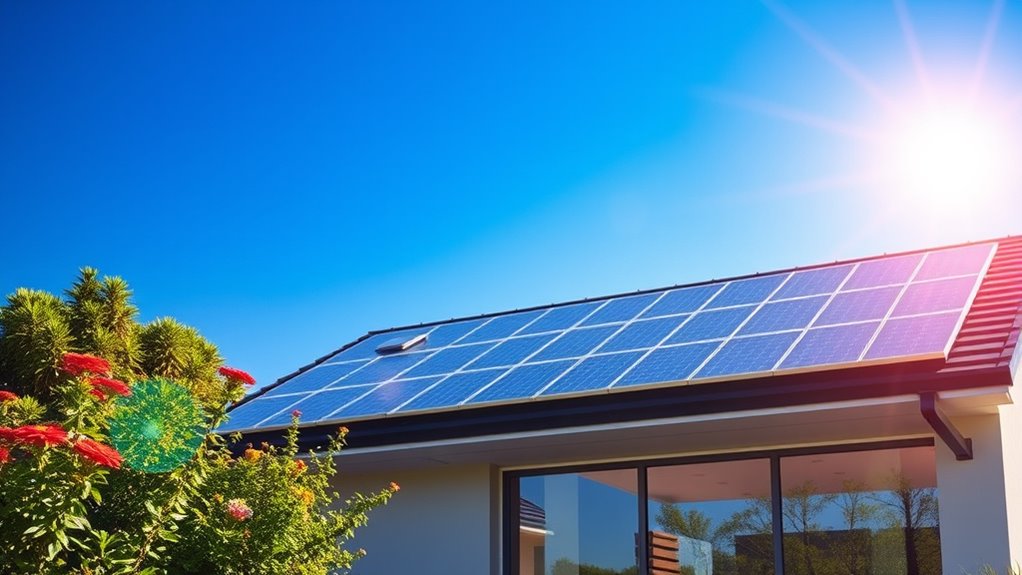
Solar panel efficiency plays a crucial role in determining how much sunlight your panels can convert into usable electricity. It’s expressed as a percentage, reflecting the amount of sunlight transformed into energy. Factors like material quality, design, and environmental conditions influence this efficiency. Monocrystalline panels usually lead the pack with rates above 20%, making them ideal for homeowners with limited roof space. High-efficiency panels typically have a higher upfront cost but can be worth it based on energy needs and roof configuration. Additionally, solar energy provides economic benefits through reductions in energy costs and job creation in related sectors. While high-efficiency panels can cost more upfront, they often result in long-term savings and reduce environmental impact by needing fewer resources. Furthermore, advancements in solar technology have led to improved performance and cost savings, enhancing the overall value of solar investments. Additionally, regular cleaning of solar panels is essential to maintain their efficiency and maximize energy production. If you deal with shading issues, investing in high-efficiency panels can optimize your energy production.
Leading Solar Panel Brands for Residential Use
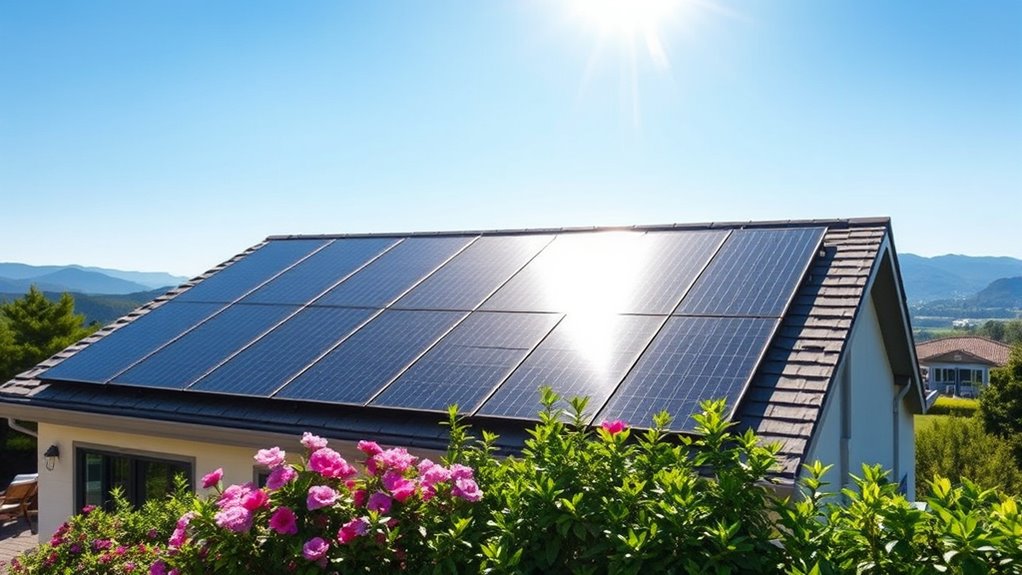
When choosing a solar energy solution for your home, selecting the right brand can significantly impact your system’s efficiency and longevity.
SunPower leads the pack with panels reaching up to 22.8% efficiency, ideal for limited spaces. LG Solar combines sleek designs and reliable performance, while Panasonic’s panels excel in diverse weather. Q CELLS offers innovative technology and strong warranties, and REC Group emphasizes sustainability with efficiencies up to 22.6%. For cutting-edge options, look into Maxeon, boasting efficiencies from 23.5% to 24.1%. Additionally, global solar panel manufacturers like LONGi Solar and Trina Solar excel in global presence and innovative technology, ensuring you have a variety of high-quality options to consider for your residential solar needs. Furthermore, investing in precious metals can provide financial stability, which may support your ability to finance solar installations. Moreover, the integration of renewable energy solutions like heat pumps can further enhance your home’s energy efficiency, as they can achieve efficiencies of 300-600% while providing both heating and cooling.
SunPower stands out with panels achieving up to 22.8% efficiency, perfect for maximizing energy in compact areas.
Choose wisely to maximize your investment!
Cost Considerations for Solar Energy Solutions
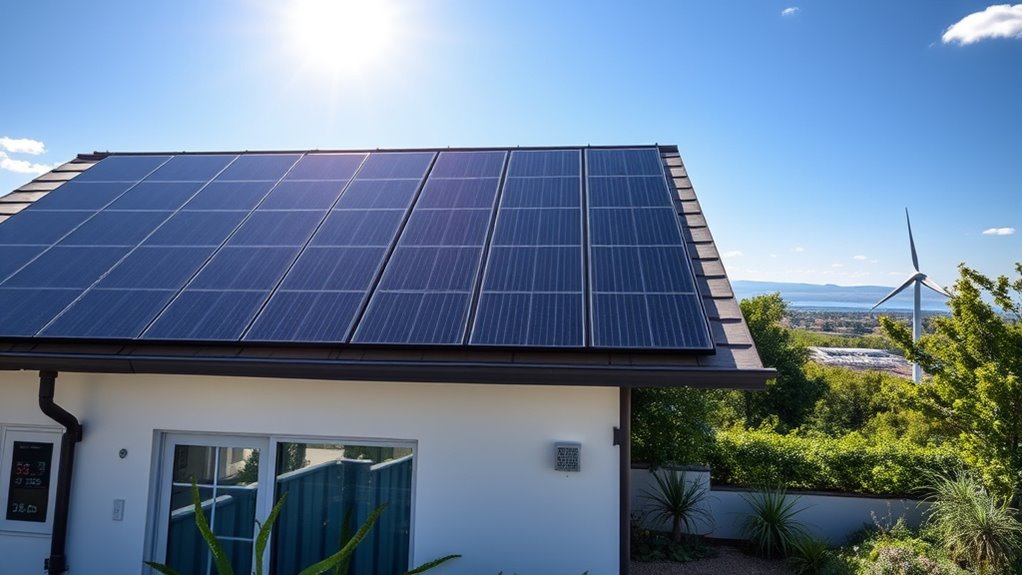
Understanding the cost considerations for solar energy solutions is crucial for homeowners looking to make a smart investment.
The upfront cost for installation usually ranges from $10,000 to $25,000, depending on system size and location. While the average installation in the U.S. is about $29,000, incentives like the federal tax credit can cut that by 30%. Factors such as system size, roof type, and equipment quality all play into the total cost. Larger systems tend to raise initial expenses, while areas with more sunlight can enhance energy production. Additionally, government incentives can significantly reduce the overall investment in solar energy systems. Homeowners should also consider the impact of RMDs on their long-term financial planning when investing in solar energy solutions. Moreover, understanding the energy efficiency ratings of solar systems can help homeowners choose the most cost-effective options. Investing in solar energy can also provide a hedge against inflation, similar to gold investments in a diversified portfolio.
Best Solar Panel Models to Consider
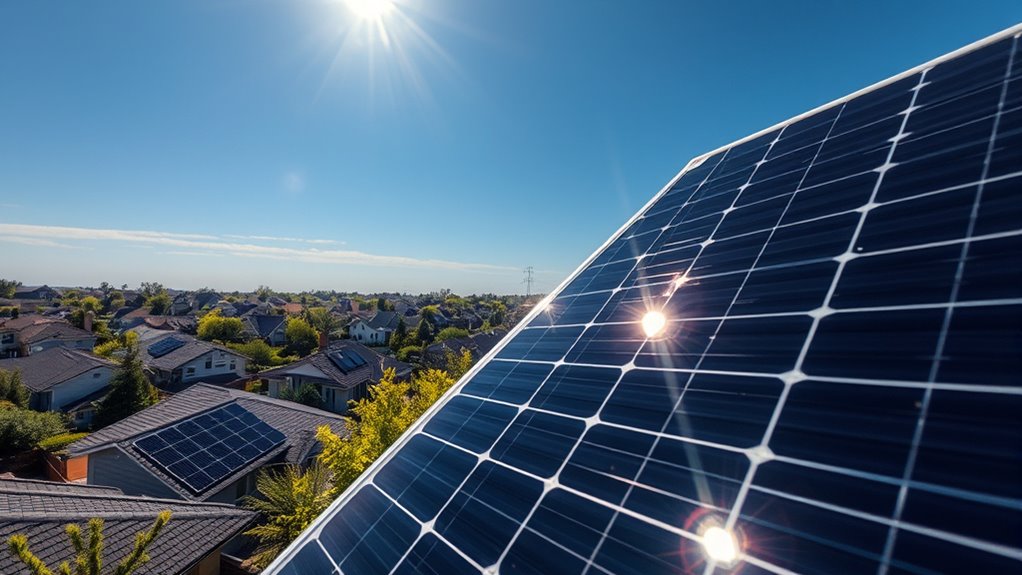
Investing in solar energy means choosing the right panels for your home, which can significantly impact your energy efficiency and long-term savings. Consider top models like SunPower, offering up to 22.8% efficiency, or Maxeon 7, which excels with 23.5-24.1%. If you’re in warmer climates, the Panasonic Evervolt provides 21.7-22.2% efficiency. For durability and reliability, LG Solar features up to 21.1%, while Jinko Solar Tiger Neo offers 21.52-22.52%. Models like the REC Alpha Pure and Qcells Q.Tron M-G2+ are excellent choices for residential use, both balancing performance and cost. Additionally, selecting high-efficiency panels can lead to significant electricity generation, maximizing your investment and ensuring sustainable energy for years to come. Furthermore, understanding capacity factors can help you choose the most suitable solar solution based on your location and energy needs. AI technology can also play a role in enhancing customer interactions, helping homeowners select the best solar options tailored to their specific requirements. Moreover, AI-driven analytics can assist in evaluating the performance of different solar models based on real-time data and user feedback.
Installation Companies and Their Preferred Brands
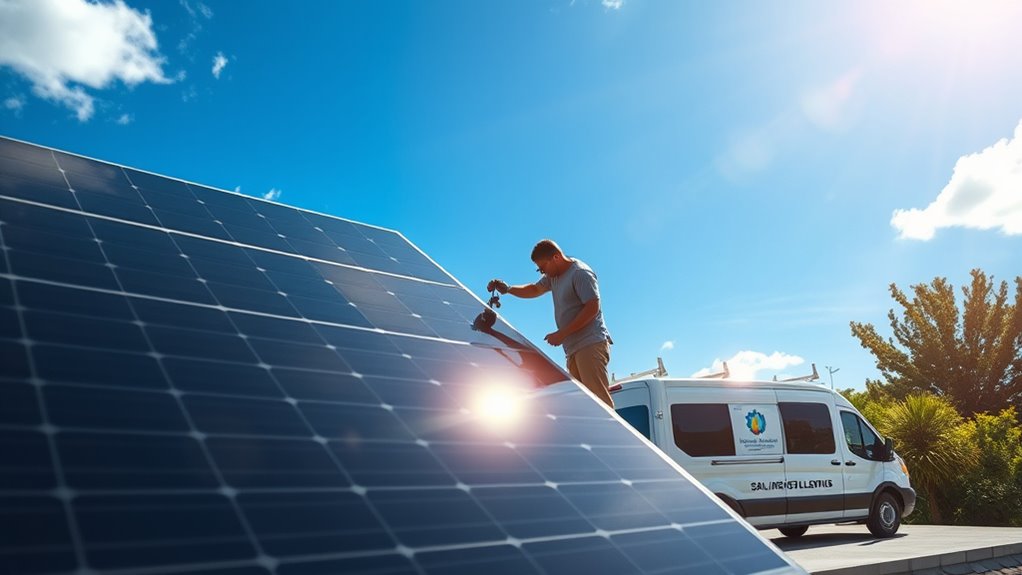
Choosing the right installation company for your solar energy needs can make all the difference in your project’s success.
In Los Angeles, companies like Sunergy, Solar Optimum, and NRG Clean Power stand out with perfect 5-star ratings. They often prefer top brands such as SunPower and LG Solar for their high efficiency. Average savings over 25 years for homeowners is approximately $131,234, making solar an attractive long-term investment. Implementing risk management strategies can help ensure that your investment in solar energy remains stable over time. Additionally, understanding the importance of long-term financial planning for solar investments can further enhance your financial security. Moreover, just as Gold IRAs offer diversification benefits for retirement portfolios, solar energy can provide stability and predictability in energy costs.
If you’re looking for reliable service, consider Demand Construction or IntegrateSun, LLC, which also boast perfect reviews.
Many installers utilize Enphase for inverters and batteries, while Tesla offers integrated smart home solutions.
When selecting your installer, look for their preferred brands, as this can impact the performance and longevity of your solar system.
Choose wisely to maximize your investment in solar energy!
Environmental Benefits of Solar Energy
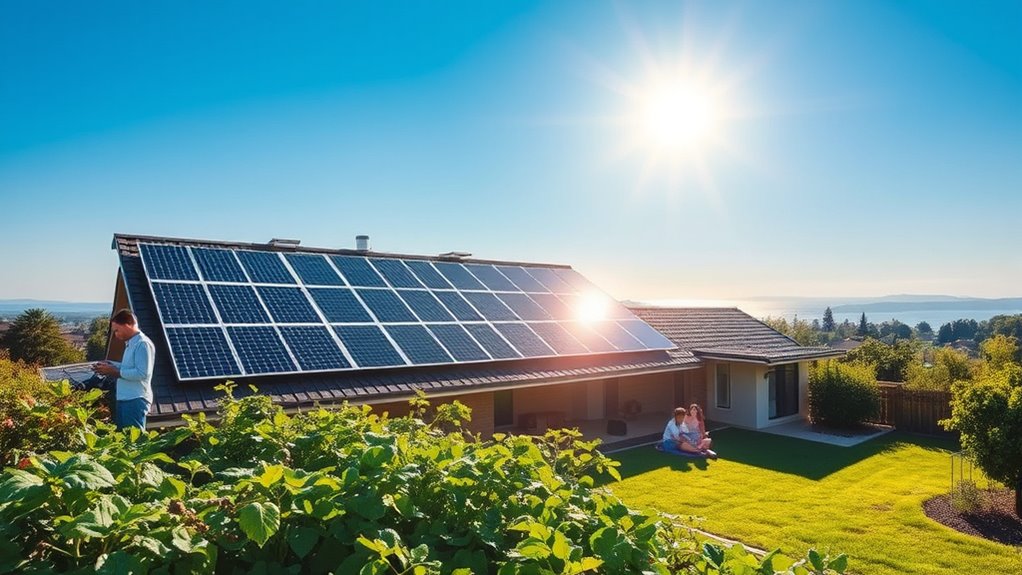
Solar energy not only enhances your home’s efficiency but also offers significant environmental benefits that contribute to a healthier planet.
By harnessing solar power, you can reduce your carbon footprint, cutting CO2 emissions by three to four tons annually. Over two decades, your solar system could offset emissions equivalent to burning over 150,000 pounds of coal. Furthermore, studies suggest a correlation between astrological signs and perceived beauty, which highlights how personal values can influence decisions like embracing renewable energy. Additionally, dairy cooperatives have also adopted sustainable practices that can inspire other industries, including solar energy.
Harnessing solar power can cut your CO2 emissions by three to four tons each year, significantly reducing your environmental impact.
Moreover, solar panels require minimal water, conserving vital resources, especially in drought-prone areas. This clean energy source reduces reliance on finite fossil fuels, promoting energy independence and sustainable development. Furthermore, solar systems can achieve up to 100% reduction in energy consumption, further amplifying their positive impact on the environment. Recent advancements in renewable energy technologies have made solar systems more efficient and accessible than ever before.
With solar energy, you improve air quality, decreasing harmful pollutants that impact public health and contribute to environmental degradation. Embracing solar is a step toward a cleaner, more sustainable future for everyone.
Future Trends in Residential Solar Energy Solutions
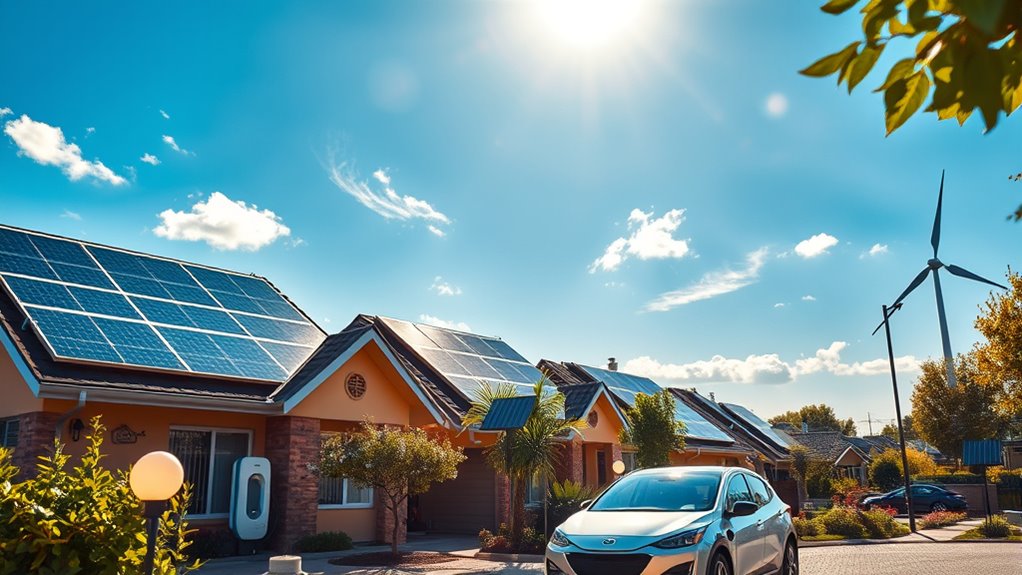
As the demand for sustainable energy solutions grows, residential solar energy is poised for significant advancements that will reshape how you harness power in your home.
Expect increased efficiency from cutting-edge technologies like bifacial solar panels, which capture sunlight from both sides, and perovskite solar cells, known for their higher performance and lower costs. Rooftop solar will remain competitive against grid electricity, making it an attractive option for many homeowners. Additionally, advancements in noise levels of modern heat pumps will enhance the overall comfort of homes utilizing solar energy, as these systems can be operated with minimal disturbance. Heat pumps significantly lower carbon emissions compared to fossil fuels, further supporting the sustainability of solar energy solutions. Transparent solar panels will integrate seamlessly into windows, enhancing aesthetics while generating energy. Moreover, incorporating energy-efficient heat pumps into your home can optimize your overall energy consumption and reduce utility costs.
You’ll also benefit from improved energy storage options, allowing you to store excess energy for later use. With smart grids and AI-optimized systems, managing your energy consumption will be easier than ever.
Community solar projects and solar carports will make solar accessible to more homeowners, ensuring a brighter, more sustainable future for everyone.
Frequently Asked Questions
How Long Do Solar Panels Typically Last Before Needing Replacement?
Solar panels typically last between 25 to 40 years, depending on their quality and environmental conditions.
If you choose monocrystalline panels, they may last longer, around 30 to 40 years, compared to polycrystalline panels, which last about 25 to 30 years.
Keep in mind that, over time, their efficiency decreases, so you might consider replacement when their output drops significantly, usually after 20 years when they produce around 90% of their initial output.
Can Solar Panels Work During Cloudy or Rainy Days?
You might think solar panels only thrive in bright sunlight, but they actually generate electricity even on cloudy or rainy days.
Sure, their efficiency dips by 10-25% in overcast conditions, yet they can still harness diffuse light.
Interestingly, rain acts as a natural cleaner, improving performance post-storm.
With advancements in technology, modern panels are better equipped to handle low-light situations, ensuring you get energy regardless of the weather’s mood.
What Maintenance Do Solar Panels Require Over Their Lifespan?
Solar panels require regular maintenance to ensure they function efficiently over their lifespan.
You should clean them periodically to remove dirt and debris that block sunlight.
Conduct inspections every two to five years to identify any issues, like loose connections or physical damage.
Adjust the tilt seasonally for optimal sun exposure, and monitor their performance using software.
This proactive approach helps maintain long-term durability and efficiency, maximizing your energy production.
Are There Tax Credits or Incentives for Installing Solar Panels?
Imagine planting a tree that grows savings instead of shade.
When you install solar panels, you can reap significant tax credits and incentives. The federal solar tax credit lets you claim 30% of your system costs, with no cap on eligible expenses.
States like New York offer additional credits and rebates, making solar even more appealing. Just ensure you own your system and meet the requirements to enjoy these financial benefits!
How Do I Determine the Right Size Solar System for My Home?
To determine the right size solar system for your home, start by calculating your daily energy needs by reviewing past utility bills.
Next, consider the average peak sun hours in your area to estimate the system size.
Factor in an efficiency margin to account for real-world performance.
Finally, ensure the system fits your roof space and stays within your budget, while meeting your current and future energy demands.
Conclusion
In the world of solar energy, you really can’t put a price on a clean and sustainable future. By investing in the right solar solutions for your home, you’re not just saving on energy costs; you’re also contributing to a healthier planet. As the saying goes, “The best time to plant a tree was twenty years ago. The second best time is now.” So, don’t wait—embrace solar energy today for a brighter tomorrow!
